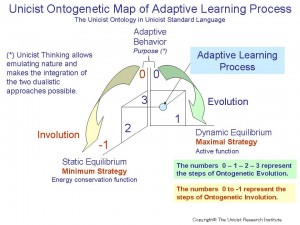Unicist Learning Technology: Static vs. Dynamic Equilibrium
 The unicist object driven learning process is based on the empowerment of the adaptive capacity of individuals. There are two different attitudes towards the environment:
The unicist object driven learning process is based on the empowerment of the adaptive capacity of individuals. There are two different attitudes towards the environment:
- Dealing with reality based on a static equilibrium
- Dealing with reality based on a dynamic equilibrium
1) Static Equilibrium
The use of dualistic logic, based on the confrontation of positions, using the disjunction “or” to deal with reality, drives individuals to a static equilibrium where their opinions prevail.
Dualistic thinking, following the natural behavior of neurons, is the less energy consuming thinking process.
This drives naturally towards an over-adaptive behavior which implies submitting, dominating or opposing to the environment.
Dualistic logic generates naturally aprioristic fallacies to deal with the environment which allows individuals to build a parallel reality that works as a comfort zone where they have no need of adapting. Domination, submission and oppositions are the alternatives they manage to feel safe.
Dualistic dialectic is the justification of the actions of individuals when they need to remain in a static equilibrium.
The positive aspect is that static equilibrium allows managing reality as a systemic model based on cause-effect relationships although complexity cannot be apprehended.
Static equilibrium is necessary to deal with methods and supernatural and religious thinking. That is why the basic educational system is based on teaching static processes in order to allow people to access the world of work.
2) Dynamic Equilibrium
Dynamic equilibrium implies adapting to reality which implies a permanent accommodation process in order to generate the necessary complementation or supplementation with the environment.
It requires using the double dialectical logic to approach reality which is based on the conjunction “and” without the existence of disjunctions. This allows individuals to influence the environment while they are being influenced by it.
It requires having a structural approach in order to be able to apprehend the fundamentals of reality and a functional approach in order to measure them in terms of results. In a dynamic equilibrium environment things are not true or false, but functional or dysfunctional.
Dynamic equilibrium requires dealing with reality as a complex adaptive system. This implies that the structure of the complex adaptive system, defined by a purpose, an active function and an energy conservation function, needs to be apprehended.
This apprehension requires the use of the double dialectical logic which demands using double dialectical thinking.
It allows apprehending the complex adaptive systems in their nature and transforming them into systemic systems making the necessary compromises without leaving aside their essential structure while measuring the results that are being achieved.
Peter Belohlavek
NOTE: The Unicist Research Institute was the pioneer in complexity science research and became a private global decentralized world-class research organization in the field of human adaptive systems.
http://www.unicist.org